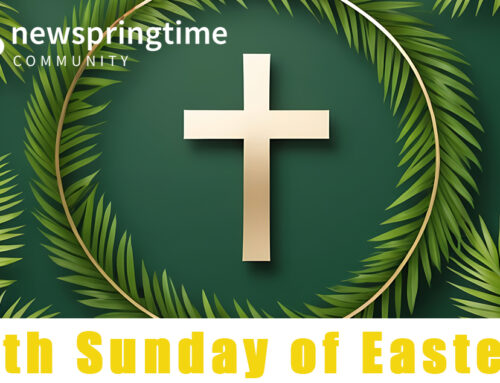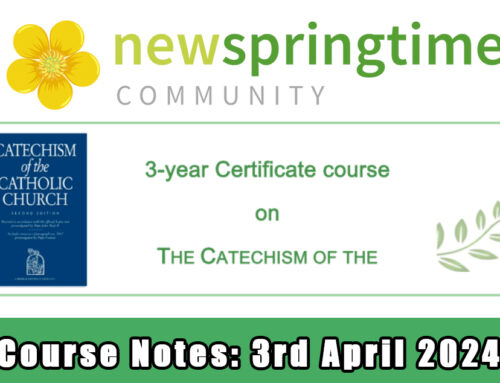The Catechism of the Catholic Church – 24th January 2024
To download The Catechism of the Catholic Church course notes for 24th Jan 2024, please click here
Commentary no 14.
Gabriel Marcel (1889-1973) was a Catholic philosopher. He made an interesting distinction between problems and mysteries. A problem is something a person can understand fully if they study it deeply, e.g., how a television works. A mystery, on the other hand, which we cannot fully understand no matter how much we study it, e.g., the nature of evil. Of course, we can grow in understanding of a mystery as a result of study, but it will always evade our complete understanding. The CCC says that the life of Jesus was a multi-dimensional mystery. Although he had a human nature like you and me, he also had a divine nature unlike you and me. His whole life manifested and revealed the mystery of God the Father “who alone is immortal and who lives in unapproachable light, whom no one has seen or can see” (1 Tim 6:16). In Jn :18 we read, “No one has ever seen God; it is the only Son, who is nearest to the Father’s heart, who has made him known.” The humanity of Christ, his words, relationships, and actions are the icon or sacrament of who God is and what God is like. That said, no matter how much we enter mystery of Christ and his earthly life, as a result of spiritual understanding, ultimately it remains beyond complete understanding (cf. Eph 3:19).
That said, everything Jesus did and said, especially during his passion, was calculated to redeem us from the sin that separates us from an intimate relationship with him and through him with our Father in heaven. The CCC tells us that Almighty God prepared the Chosen people, and some of the pagans for the coming of Christ and the revelation of mystery of God who would come to live in the midst of his people.
- As we know, for over a thousand years there were two streams of messianic prophecy, some referred to A King David type figure who would liberate the people by military and political means.
- Another stream of prophecy spoke about the coming messiah as a suffering servant.
Jesus’ first coming was in the form of the suffering servant, in his second coming he will come as King. John the Baptist, the greatest of the prophets prepared the way for Christ’s coming. Some pagans also had intimations of the virgin birth of Christ, e.g., Roman writer Virgil in his 4th Eclogue. Plato seemed to have intimations of the passion and death of Christ in The Republic.
The public ministry of Jesus is estimated to have lasted about three years. What he did from his birth up to about the age of thirty is largely a mystery and the subject of a good deal of speculation. Speaking about the mysteries of his life the Constitution on the Liturgy says in par. 102, “Within the cycle of a year, moreover, the Church unfolds the whole mystery of Christ, from the incarnation and birth until the ascension, the day of Pentecost, and the expectation of blessed hope and of the coming of the Lord. Recalling thus the mysteries of redemption, the Church opens to the faithful the riches of her Lord’s powers and merits, so that these are in some way made present for all time, and the faithful are enabled to lay hold upon them and become filled with saving grace.” That is obvious in the Liturgy connected with the nativity of Jesus, when it recalls his circumcision, Epiphany, the presentation the Temple, flight into Egypt, and the return of the holy family.
The scriptures tell us that Jesus was like us in all things but sin. It would seem that he led an ordinary life as a pious Jew. He was obedient to Joseph and Mary, prayed, attended the synagogue, helped his father in the construction industry, possibly as a stone mason and carpenter in the nearby town of Sepphoris, 6 kilometers away. It would appear that he had many relatives in Nazareth. In Mk 6:3 we read, “Isn’t this Mary’s son and the brother of James, Joseph, Judas, and Simon? Aren’t his sisters here with us?” The story of the finding in the temple shows that at the age of 12 Jesus was seeking wisdom by listening to the teachers of the law by asking them questions, as Sir 6:32-36 had advised.
When we read about the mysteries of Christ’s life before and after his baptism in the Jordan, we can recall what par 521 of the CCC says, “Christ enables us to live in him all that he himself lived, and he lives it in us.” Writing about this St John Eudes said, “We ought to imitate and complete in ourselves the various states and mysteries of Christ . . . The Son of God plans to make us sharers in his mysteries, and, in a certain manner, continues them in us and in the Church by the graces which he has decided to communicate to us.”





